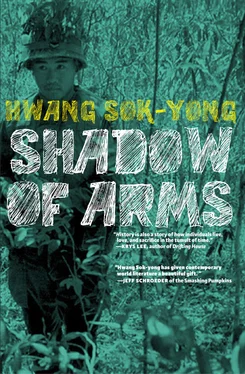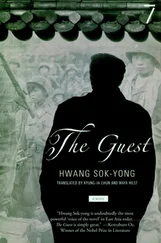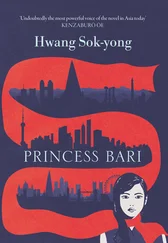Interrogator: Sergeant Nguyen, are these men the ones who entered the Quonset at that time?
Nguyen: That’s correct. Those two men came inside.
Interrogator: Lieutenant Sloat, why did you summon these two, of all the prisoners?
Sloat: I had seen their personal records. In the first place, Cole was an officer and a college graduate, and his charge on an accidental shooting didn’t seem too bad. The file showed that Cole had studied Vietnamese at the officer school in San Francisco. He’d also been through a special training course in Saigon, so I figured he’d make an excellent assistant.
Interrogator: Do you mean to imply that Sergeant Nguyen was not capable of translating alone?
Sloat: I hate to say this, especially in his presence, but we intelligence officers don’t have so much faith in the Vietnamese military interpreters. After all, the Viet Cong and they are in the same family. They’re hard workers up to a certain point, but beyond that they tend to sympathize with their fellow countrymen — that means siding with the enemy. Having a Vietnamese-speaking American present would, I figured, make him more careful.
Interrogator: I see. So that explains Private Cole, but why did you summon Private Brown?
McCoy: That was the guard’s mistake. We gave him Cole’s number, but he wasn’t sure he had it right so he brought both of them. But once Brown had come into the Quonset hut, we couldn’t just let him go back.
Interrogator: Why not? You mean to maintain secrecy?
Sloat: Yes.
Interrogator: Then you had planned in advance to commit the atrocities. So, it looks like you were trying to conceal. .
Sloat: Gathering intelligence like we do at G2 and MID requires us to dig as much information as possible out of prisoners in the shortest possible time. Our duty is to send that information immediately to our forces in the field, and this priority allows us to make exceptions to general principles.
Interrogator: That you dragged a suspected guerrilla to the military prison, was that also against general rules?
Sloat: Yes, sir. Unless we maintain strict security, there’s a lot of leakage, and unflattering publicity can be exploited by the enemy.
Interrogator: In this case, weren’t you were more concerned with your own forces learning about your secret interrogation methods than about leaks to the enemy?
Sloat: In every department, the methods and procedures used to carry out a task are evaluated by the results. The task I undertook was not the kind of work requiring strict adherence to military regulations or the rules stipulated in international treaties.
Interrogator: The informant may state how the defendants coerced you into taking part in this misconduct.
Cole: Lieutenant Sloat called out my name to confirm which of the two of us was Marvin Cole.
Brown: He was angry that the main gate sentry had brought me along too. He ordered me to stay inside with Marvin until the work was finished. The lieutenant introduced everyone one by one and then, pointing at the boy, said they were going to interrogate him. Master Sergeant McCoy suddenly turned the dimmer all the way up, and the light was shining straight in the boy’s face. The boy, who was sitting bound to a metal chair, grimaced and tried to turn his face away. Only then did I notice the boy had already been beaten. His mouth and chin were all smeared with his own blood.
Cole: I felt so sorry for the boy I couldn’t even look him in the face.
Interrogator: The boy’s age is recorded as fourteen. Was he beaten?
McCoy: We hadn’t laid a finger on him at that point. At the time of his arrest one of the patrol troops had beaten him with a rifle butt.
Cole: That’s a lie. Their Jeep drove right past us prisoners as we paused from working. At that time the boy’s face was pale, but not bloody.
Sloat: Usually, we strip the guerrillas before we interrogate them. They might have something concealed, and anyway we need to check and see if they show any signs of having been in the jungle or any scars from shrapnel to determine whether they’re veteran guerrillas. Sergeant McCoy was bitten while trying to undress the boy. So he hit him, not that hard, and it seemed the boy caught it the wrong way.
Cole: He said he was going to start interrogating and I should interpret. But Howard, who was standing beside me, gave me a nudge as a signal not to do it. I hung my head and remained silent. Sloat said I better cooperate, and that they had to get information on the organization of local guerrillas. He also told me to forget about the prison. I asked him what that little boy, much younger than my own kid brother, could possibly have to do with the Viet Cong. Sergeant McCoy said the little bastard had been captured on Route 1 trying to ambush one of our patrols. The lieutenant then explained why he had summoned me instead of calling in another official interpreter. Since they were due to ship back home within a year, the case might be publicized back in the States, that was his explanation. But it would be safe with me, he said, because I had to serve three more years of time in prison, and then return to my unit to complete my hitch. Then he said that, depending on how things went, he could arrange for me to work outside the prison, at the division headquarters, or out on some field detachment. Then I decided I had no choice but to cooperate.
McCoy: The surprise ambushes of the guerrillas along Route 1 were giving us a real headache. The day before the boy was captured, several spots on the road were hit. At dawn the same day, a Jeep was blown up and three American soldiers inside were killed.
Sloat: The boy was carrying a bundle of Russian-made hand grenades. They were bundled up in a club shape with a percussion detonator hooked up. The little bastard apparently had been transporting supplies for the guerrillas. The patrol took the grenades and also medical supplies off of him. It was a period when we were taking constant casualties without accomplishing much, and all of us intelligence officers were being pressed hard by our senior staff officers. It was urgent that we find out where the boy was heading with those supplies.
Cole: I had them untie the little boy’s hands and interpreted Nguyen’s questions and the boy’s replies for Lieutenant Sloat. Under the bright light the boy’s black hair, his pale forehead and cheeks, and his brown eyes stood out distinctly. So did the dried blood stuck all over his soft chin. Whenever Nguyen asked him something, the boy struggled to speak through his torn lip.
Interrogator: Do you recall the contents of the questioning?
Cole: At first, Nguyen asked him where he got that stuff. The boy said from a dead soldier. An American soldier? A North Vietnamese soldier. Where was it, the dead body? On Route 1. There was no dead body of a North Vietnamese soldier on that road, in fact, was there? There was, next to a stream by the road. Why did you pick up the grenades? To protect myself. Where did the medical supplies come from? From the same dead soldier. But North Vietnamese fighters don’t carry antibiotics or painkillers, do they? I don’t know what those are. Where were you taking those supplies, tell the truth. I was on my way to see my sister in Qua Jiang. There was fighting on the other road, so I was scared. Now, given me a straight answer. Where were you taking those supplies? Really, I was not taking them anywhere, I was just going to my sister’s. My parents were killed. That was more or less how the interrogation went. McCoy was impatient, and he said heatedly that if they left the boy to him, he’d get some answers out of the little devil in no time.
Interrogator: When did the torture begin, and who initiated it?
Brown: That sergeant started to rough him up. He slugged the boy with his fists right in front of us.
Читать дальше












